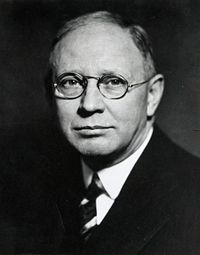Clark L. Hull Scientist
Clark Leonard Hull (May 24, 1884 – May 10, 1952) was an influential American psychologist who sought to explain learning and motivation by scientific laws of behavior. Hull is known for his debates with Edward C. Tolman. He is also known for his work in drive theory.Hull spent the mature part of his career at Yale University, where he was recruited by the president and former-psychologist, James Rowland Angell. He performed research demonstrating that his theories could predict behavior. His most significant works were the Mathematico-Deductive Theory of Rote Learning (1940), and Principles of Behavior (1943), which established his analysis of animal learning and conditioning as the dominant learning theory of its time. Hull’s model is expressed in biological terms: Organisms suffer deprivation; deprivation creates needs; needs activate drives; drives activate behavior; behavior is goal directed; achieving the goal has survival value.He is perhaps best known for the "goal gradient" effect or hypothesis, wherein organisms spend disproportionate amounts of effort in the final stages of attainment of the object of drives. Due to the lack of popularity of behaviorism in modern contexts it is little referenced today or bracketed as obsolete.
